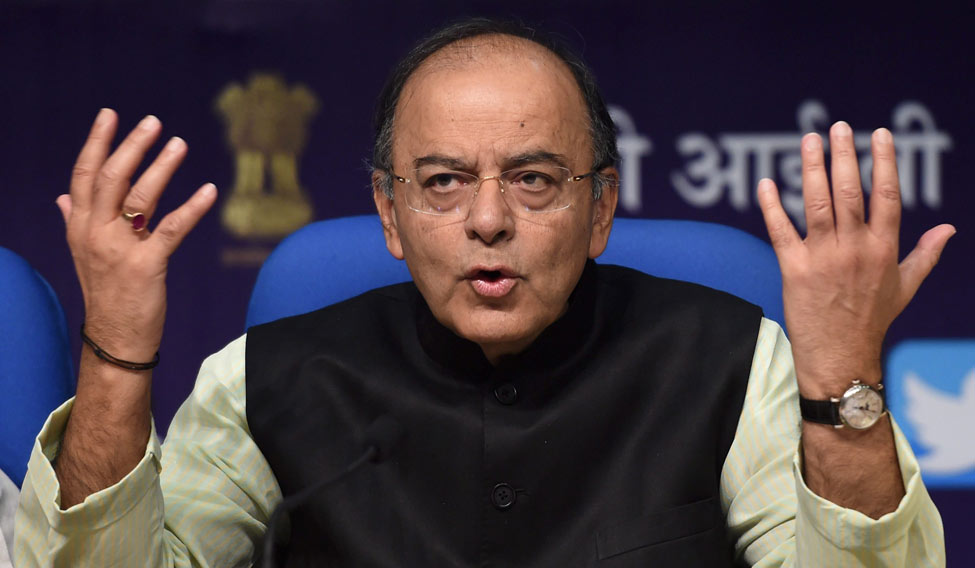Ahead of the first anniversary of the Centre's biggest decision against curbing of the black money menace, Finance Minister Arun Jaitley on Tuesday said that November 8 will be remembered "as a watershed moment in the history of Indian economy".
In a write-up published on Facebook, Jaitley penned a piece for the demonetisation drive's one-year anniversary, saying the day would be stated as the current government's cure for the country from the "dreaded disease of black money".
"When the country is participating in "Anti-Black Money Day", a debate was started whether the entire exercise of demonetisation has served any intended purpose. This narrative attempts to bring out positive outcomes of demonetisation in short-term and medium-term with respect to stated objectives," he said.
In a detailed insight on the steps taken by the present government to curb corruption and circulation of black money, Jaitley said it was the "hidden urge" of a large section of society to get rid of this "menace".
"We, the Indians, were forced to live with this attitude of chalta hai with respect to corruption and black money and the brunt of this attitude was faced particularly by the middle class and lower strata of society. It was a hidden urge of the larger section of our society for a long period to root out the curse of corruption and black money; and it was this urge which manifested in the verdict of people in May 2014. Immediately after taking up responsibility in May 2014, this government decided to fulfil the wish of the people in tackling the menace of black money by constituting SIT on black money," Jaitley added.
"Another example of lack of will to fight against black money was the delay of 28 years in implementation of Benami Property Act. This government took decisions and implemented the earlier provisions of law in a well-considered and planned manner over three years to meet the objective of fight against black money. These decisions span from setting up of SIT to passing of necessary laws for foreign assets to demonetisation and to implementation of GST," he added.
Reiterating his stance on the drawbacks of excessive flow of cash in the economy, Jaitley said the anonymity of cash transactions could pose a threat; following which demonetisation was rolled out to put identity on the cash holdings in the economy. Further, he said the reduction in currency in circulation from the base scenario reflects that this intended objective has been met.
"With the return of Rs.15.28 lakh crore in the formal banking system, almost entire cash holding of the economy now has an address. It is no more anonymous. From this inflow, the amount involving suspicious transactions based on various estimates ranges from Rs.1.6 lakh crore to Rs.1.7 lakh crore. Now it is with the tax administration and other enforcement agencies to use big data analytics and crack down on suspicious transactions," he said.
However he notified that based on big data analytics, cash seizure by Income Tax Department doubled in 2016-17 when compared to 2015-16; during search and seizure by the Department Rs 15,497 crore of undisclosed income has been admitted which is 38 per cent higher than the undisclosed amount admitted during 2015-16; and undisclosed income detected during surveys in 2016-17 is Rs 13,716 crore which is 41 per cent higher than the detection made in 2015-16.
Further, undisclosed income admitted and undisclosed income detected taken together amounts to Rs 29, 213 crore; which is close to 18 per cent of the amount involved in suspicious transactions. This process will gain momentum under Operation Clean Money launched on January 31 this year, he said.
On the crackdown on shell companies, Jaitley stated that the leads gathered due to data collected during demonetisation period have led to identification of 2.97 lakh suspect shell companies. After issuance of statutory notices to these companies and following due process under the law, 2.24 lakh companies have been de-registered from the books of Registrar of Companies. Actions is also being taken for freezing their bank accounts and debarring their directors from being on board of any company, he said.
He also analysed that demonetisation has led to an acceleration in the financialisation of savings.
On the digital payments front, Jaitley claimed that 110 crore transactions, valued at around Rs 3.3 lakh crore and another 240 crore transactions, valued at Rs 3.3 lakh crore were carried out through credit cards and debit cards, respectively. Further, total value of transaction with Pre-Paid instruments (PPIs) have increased from Rs 48, 800 crore in 2015-16 to Rs 83, 800 crore in 2016-17. During 2016-17, National Electronic Funds Transfer (NEFT) handled 160 crore transactions valued at Rs 120 lakh crore, up from around 130 crore transactions for Rs 83 lakh crore in the previous year, he said.
Demonetisation, Jaitley said, has led to a reduction in incidences of stone pelting, protests in Jammu and Kashmir, and naxal activities in LWE affected districts, with restricted access to Fake Indian Currency Note (FICN) as well.
"During 2016-17, the detection of FICN for Rs.1000 denomination increased from 1.43 lakh pieces to 2.56 lakh pieces. At the Reserve Bank's currency verification and processing system, during 2015-16, there were 2.4 pieces of FICNs of Rs 500 denomination and 5.8 pieces of FICNs of Rs 1000 denomination for every million pieces notes processed; which rose to 5.5 pieces and 12.4 pieces, respectively, during the post-demonetisation period. This shows almost doubling of such detection," he said.
Jaitley opined that with the introduction of the move, the economy is moving towards a cleaner, transparent and honest financial system.





